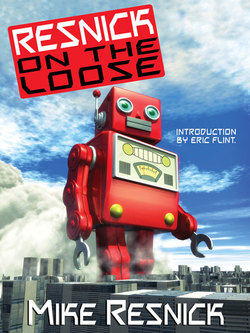Читать книгу Resnick on the Loose - Mike Resnick - Страница 19
На сайте Литреса книга снята с продажи.
ОглавлениеLast Impressions
I met a young man at a recent convention. He had submitted a story he thought was wonderful to Jim Baen’s Universe, and it had been turned down. Never got as far as Eric or me.
Okay, these things happen. Lots. For every would-be writer who can sell a story, there are dozens who never will.
But let me give you a little hint: if you don’t have faith in your story, why should anyone else—like, for example, an editor? First impressions are important…but it’s last impressions that count. I’m not saying that every rejected story is a misunderstood gem, but a story that remains in a desk drawer or a computer file never has a chance of being understood or misunderstood.
Ever hear of a novel called Up the Down Staircase? It spent a year on the New York Times bestseller list, and was a major motion picture starring Sandy Dennis, back in the bygone days when she was a major motion picture actress.
That was a last impression. You know how many times the book was turned down?
88.
You know how it finally sold? The author, Bel Kaufman, showed it to her minister’s wife, whose brother happened to be peripherally connected to the publishing industry, and one thing led to another, and suddenly the 88-times-rejected manuscript was the Number One seller in the country. I guess it’s lucky that the author didn’t burn the damned thing after the 50th or 75th turndown after all.
You think that just happens in other fields?
Every publisher, major and minor, in the science fiction field turned down Frank Herbert’s Dune. Every one, without exception. You know how it finally sold? Sterling Lanier, who had written some science fiction in the 1950s, was editing at Chilton, a book company that specialized in, so help me, books on motorcycle maintenance. He had hardly any budget to spend on such a flyer, but Herbert had reached the point where he was happy to take hardly any money for it. And the rest is history: a perennial bestseller, with something like 40 million copies sold worldwide, five bestselling sequels by Herbert and a batch more by his son Brian in collaboration with Kevin J. Anderson, two movies already made and a third in pre-production. All because Herbert believed in his book, and despite all those editorial first impressions that it was unsaleable, it was the last impression that counted.
Just one example, you suggest? Not hardly. One of the three or four most prestigious novels since Dune has been Joe Haldeman’s The Forever War: Hugo winner, Nebula winner, bestseller—and, according to Joe, it was turned down by 16 publishers before he sold it.
It doesn’t just happen in novels, and it doesn’t just reflect poorly upon some editors.
For example, a single brilliant novelette is sometimes enough to make an author’s career. That was certainly the case with Tom Godwin’s “The Cold Equations,” which 55 years after its initial appearance remains the most-discussed novelette on the internet, and was even the basis for a made-for-TV movie. Roger Zelazny became a superstar very early on with the publication of “A Rose for Ecclesiastes.” Cyril Kornbluth is remembered (as a solo writer, apart from his collaborations with Fred Pohl) primarily for “The Little Black Bag.” A couple of brilliant novellas, Walter M. Miller Jr.’s “A Canticle for Leibowitz” and Orson Scott Card’s “Ender’s Game” were so stunning and influential that each was expanded into a perennial bestselling novel.
And the same is true of novellas. Harlan Ellison’s “A Boy and His Dog” and Thomas M. Disch’s “The Brave Little Toaster” were both so well-written and had such universal appeal that they were made into motion pictures.
Speaking of motion pictures, Kurt Vonnegut’s Slaughterhouse-Five was a major theatrical release with a top-notch cast. They haven’t made any movies out of Gene Wolfe’s Book of the New Sun series or Niven & Pournelle’s The Moat in God’s Eye, but there’s no question that these have entered the realm of universally acknowledged Science Fiction Classic.
And you know something? Every single book and story I named in the preceding three paragraphs lost the Hugo. I don’t mean that they were overlooked in obscure publications, or they came out so late in the year that no one had time to read them. Every one of them was a Hugo nominee—and not one impressed enough voters at the time to win.
I have to think that any writer would rather have had any of these stories to his credit that the mostly-forgotten tales that beat them at the time.
I was told a long time ago that if I wrote a good story, and it was rejected, I could give up on the editor and/or the market, but I should never give up on the story. I take that to be an axiom, and I need look no farther than the examples I have just offered you to conclude that last impressions beat the hell out of first ones.
